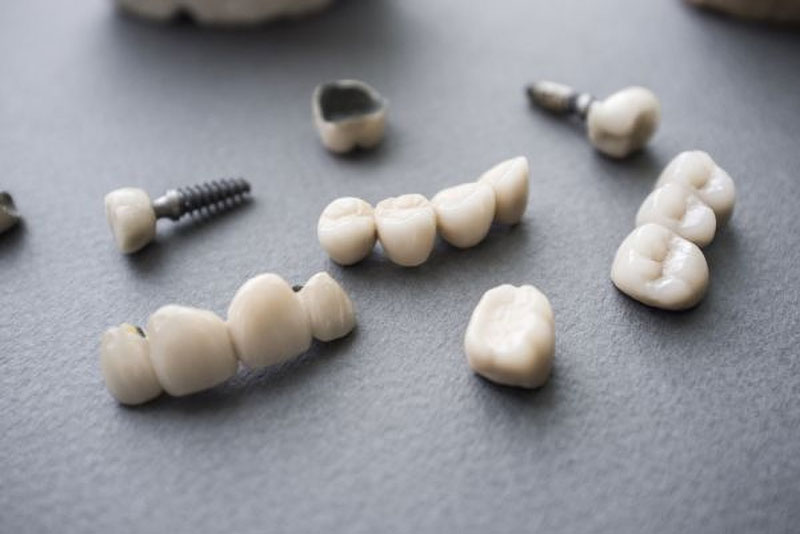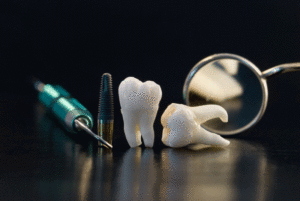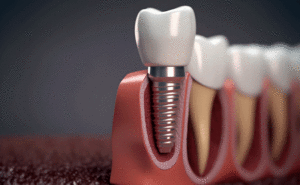Have a cracked, decayed or broken tooth? If so, there’s a good chance that your dentist will treat it with a dental crown, or a tooth-shaped cap, that is placed over the tooth in order to restore it to its original shape and size, as well as improve its appearance and strengthen it. Specifically, crowns are cemented into place and completely encase the tooth from the gum line on up.
How Are Crowns Used By The Doctor?
Crowns are typically administered over two separate dental appointments. At the first appointment, the dentist will take the necessary measurements and moldings, then send the data off to a dental lab where a permanent crown can be manufactured. However, since it usually takes anywhere from two to three weeks to manufacture the permanent dental crown, the dentist will apply a temporary crown at this first initial visit. Temporary crowns are usually made of acrylic and bonded into place using a temporary cement.
Fortunately, Dr. Caven uses amazing CEREC Technology for most of his implanted crowns. That means there is no need for any temporary crowns or even impressions. The final crown is given to you that very day. But there are still times that temporary crowns are utilized.
Dental patients being treated with a crown receive both a temporary crown and a permanent crown and it’s important to know how to properly care for both. Thankfully, there’s not a whole lot of TLC that goes into properly caring for either type of crown. Here’s a closer look:
Caring for a Temporary Crown
As noted, temporary crowns are only worn for a few weeks until the permanent crown is made and applied. With that in mind, here’s a look at how dentists recommend that these crowns are cared for:
- Avoid sticky foods: Eating sticky and chewy foods could potentially attach to the crown and remove it, so dentists recommend staying away from the likes of chewing gum and caramel.
- Minimize use: Typically, it’s near the back of the mouth where teeth require crowns, as those teeth are more difficult to reach with a brush and floss. So dentists recommend chewing primarily with the opposite side of the mouth after a temporary crown has been applied.
- No hard foods: Raw vegetables, peanut brittle and other hard foods are no-nos with a temporary crown, much like sticky and chewy foods, they have the potential to dislodge the crown.
- Floss correctly: Dentists recommend lifting floss out from between the teeth to dislodge food. But with a temporary crown, it’s recommended that you gently slide out the floss, as to not potentially dislodge the crown.
Caring for a Permanent Crown
Dental crowns typically last anywhere from 5 to 15 years, and this lifespan largely weighs on how good your oral habits are. While permanent crowns are much less maintenance than a temporary crown, here’s a look on how to best care for one to ensure they’re long lasting:
- Practice good oral habits: Refrain from grinding teeth, biting nails, chewing ice and using your teeth to open packaging, as they can potentially lead to a loose crown.
- Brush and floss appropriately: Many people are under the impression that an underlying tooth treated with a crown is immune from further decay. That’s false – a dental crown does not rule out gum disease or further decay, so it’s important to brush and floss like it does. Brushing twice a day and flossing at least once a day, while paying special attention to the area where gum meets tooth is recommended.
- Mouthwash: Dentists also recommend using an antibacterial mouth rinse, which helps treat the area around the crown.
Do You Have More Questions?
Crowns are a simple, effective and cost conscious way to treat damaged teeth. What’s more is that they’re easy and convenient to care for as well especially with the amazing CEREC Technology. For more information on dental crowns, contact our doctors, Dr. Richard Caven, Dr. Shelby Denman, and Dr. Stephen Carpenter, by calling our Caven Dental office in Jacksonville, FL, to schedule a consultation today!



